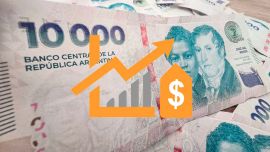Prices for grains slid after Argentina, a major supplier, devalued its currency in a move that could encourage farmers to sell more of their crops into global markets.
Wheat futures for March delivery lost as much as three percent on the Chicago Board of Trade. Corn and soybean contracts with similar maturity dates fell as much as 1.6 percent.
Argentina’s newly inaugurated administration has weakened the nation’s official exchange rate to 800 pesos per dollar, marking the first steps of President Javier Milei’s “shock therapy” measures to boost exports and fix a crumbling economy. The move means grain producers will now receive more cash from their sales, which are typically tied to dollar values on export markets, encouraging more exports.
Any increase in Argentine exports comes when grain prices have generally been curbed by rising supplies and lagging demand, adding further pricing pressure.
“Certainly what happened in Argentina contributed to the weakness that we see today,” said Arlan Suderman, chief commodities economist at StoneX Financial Inc.
The devaluation should spur sales of the little more than 2 million metric tons of soybeans left over from this year’s harvest. Farmers also have 5.4 million tons of corn and 11 million tons of wheat left to sell, according to Argentine brokerage house Zeni. The revised exchange rate should also more than offset the impact of higher taxes on corn and wheat, a move aimed at boosting government revenues, Zeni analyst Eugenio Irazuegui said.
The new exchange rate “is going to get the market moving,” said Juan Ouwerkerk, who heads an agriculture cooperative in Buenos Aires Province. “We’ll start to see selling after a very quiet last two weeks.”
A weaker peso may also boost the cost of imported agricultural inputs such as fertilisers, partially offsetting the increase in farmers’ revenues. Still, Francisco Perkins, a grower in Pehuajó, Buenos Aires Province, said farmers are better off in the long run with Milei.
“This exchange rate is much more competitive,” Perkins said. “We’re on the right path.”



















Comments